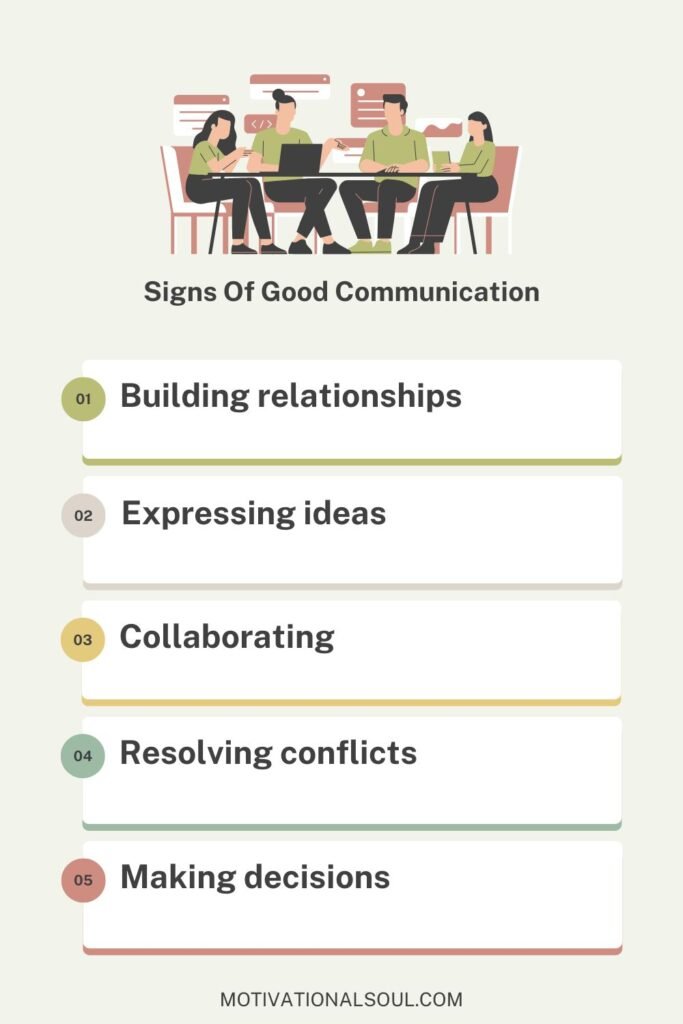Signs And Need Of Good Communication

Are you grappling with persistent roadblocks in your career or personal life? You may find that your communication style quietly undermines your progress. Communication remains one of the most potent skills you can cultivate, fueling victories in nearly every facet of life. In this post, we’ll sift through the clues that your communication approach could use fine-tuning. We’ll also delve into practical strategies for strengthening your ability to connect with those around you. Ready to begin?
“Communication works for those who work at it.” – John Powell
Why Good Communication Is Essential
Communication propels every sphere of life—both private and professional. Here’s why honing your communication abilities is so crucial:
- Building Relationships
Genuine bonds with friends, family, colleagues, and clients emerge when we speak and listen with sincerity. Such openness forges trust, empathy, and shared respect. - Expressing Ideas
When you convey your thoughts with color and precision, you heighten the odds that others will truly comprehend and embrace them. - Collaborating
Whether coordinating a workplace project or organizing a family gathering, purposeful communication unites efforts, aligns aspirations, and enriches group achievements. - Resolving Conflicts
Misunderstandings are inevitable, but clear, empathetic exchange can untangle disputes, highlight shared interests, and guide people toward amicable agreement. - Making Decisions
High-caliber decisions typically call for thoughtful input and clear presentations of views, allowing everyone to weigh possibilities insightfully. - Achieving Goals
From shaping objectives to inspiring a team, persuasive communication illuminates the path to personal and collective successes. - Providing Feedback
Respectfully offering either constructive critique or heartfelt praise can unlock a person’s potential and sharpen their strengths.
“In the long history of humankind, those who learned to collaborate and improvise most effectively have prevailed.” – Charles Darwin
Signs Of Good Communication
Curious about how to identify robust communicative skills in yourself or others? Keep an eye out for these markers:
- Active Listening
Granting undivided attention, absorbing another’s words without rushing to respond. - Clear Articulation
Speaking so that your point shines through, choosing tone and vocabulary that resonate with your audience. - Empathy
Venturing into another’s emotional realm and genuinely caring about their perspective. - Respect
Upholding politeness, dignity, and professionalism during every encounter. - Clarity
Delivering your message without ambiguity or needless jargon. - Consistency
Maintaining a dependable message and approach from start to finish. - Feedback
Offering insights—both encouraging and constructive—that shed light and foster growth. - Openness
Freely sharing thoughts and ideas while remaining transparent about motives and feelings. - Honesty
Cultivating trust by telling the truth and embodying genuine integrity. - Patience
Allowing space for reflection, especially around complex or emotionally charged topics. - Flexibility
Adapting your style to suit distinct personalities, cultural norms, or settings. - Adaptability
Shifting your approach as situations and expectations evolve. - Positive Attitude
Infusing optimism into conversation, encouraging mutual engagement. - Clarity of Purpose
Understanding your goal and steering the dialogue to reach it. - Timeliness
Replying promptly, showing respect for other people’s schedules and obligations. - Follow-Through
Keeping promises, building reliability, and reinforcing trust. - Non-Judgmental
Focusing on possibilities and solutions rather than pointing fingers. - Understanding
Seeking to perceive the world through another’s lens, acknowledging their experiences. - Authenticity
Staying true to yourself, letting your sincerity shape what you say. - Constructive
Providing practical, actionable suggestions that spur improvement.
“Kind words can be short and easy to speak, but their echoes are truly endless.” – Mother Teresa
The Bottom Line
Communication skills profoundly influence countless dimensions of life. Pinpointing where your style might falter and dedicating yourself to growth can elevate confidence, earning potential, and interpersonal connections alike. Take note of these telling signals and invest in enhancing your communicative prowess starting now.
“If you can’t explain it simply, you don’t understand it well enough.” – Albert Einstein
Remember, consistent rehearsal and mindful practice nurture exceptional communicators. Your voice is a mighty instrument—use it with care, and watch doors swing open to fresh opportunities.
“Words are, of course, the most powerful drug used by mankind.” – Rudyard Kipling
Thank you for reading, and may your communication flourish in all the ways that matter most!




Recent Comments